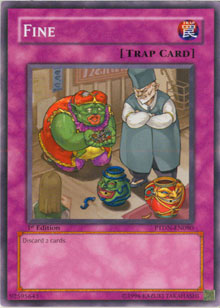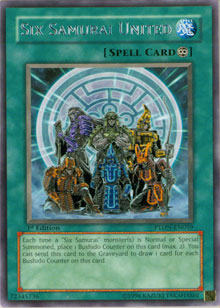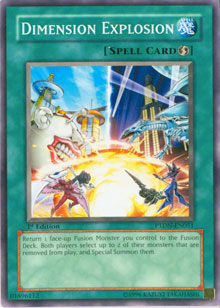I know this is a little late, but my "one-year anniversary" here on Metagame.com passed at the end of April. It’s hard to imagine that I’ve been able to write an article every week for a whole year. If I had to condense the breadth of my experience writing for this site into one sentence, I would say, "This job is hard." I’m not kidding! This is not easy. Coming up with a new topic on a weekly basis is a challenge that puts you at risk of repeating yourself or sounding like an imbecile. Being as prolific a writer as you are required to be on this site is quite a feat, in my opinion.
My topics have ranged from the insightful, to the obscure, to the downright offensive to some people’s way of thinking. I try address a good spread of topics, even if you think they have nothing to do with the game. Some of it may sound very Psychology 101, but I think (and hope) it’s still very useful. I’ve realized that getting compensated for doing something you love is a rare opportunity that doesn’t come around too often. I’m very fortunate to have had a good year writing for this site. I look forward to improving my writing and publishing many more articles this year.
Setting aside the shameless self-appraisals and nostalgia, the real purpose of this article is to acknowledge ten lessons I’ve learned in the course of my Yu-Gi-Oh! TCG days. I hope I have something to offer you in the area of practical, useful, and simple advice to improve your game. We’ll begin in reverse order:
Lesson #10: Metagames are fad-based.
 Yes, I said it. Metagames don’t evolve as rapidly as they should unless there’s a highly publicized event that proves the dominant deck to be inadequate. The nature of the internet has blessed us with this phenomenon. When one deck beats the current one, the majority will follow. Naively, I used to believe that metagame evolutions were based wholly on skill, creative innovation, and self-correction mimicking free markets. As I played this game more and more, I realized that metagames are also shaped by what many of my friends call "The Deck of the Month." (This term is figurative, of course, since metagames tend to change every two to three months.) When the new "Deck of the Month" debuts, it quickly converts many non-believers into fervent disciples. What this creates is a form of tunnel vision that filters how you view the game. It turns the game into a duality of "Deck of the Month" versus "everything else that’s not as good because we can’t afford to build a Deck of the Month." Either pick the dominant deck or lose. This sad state of affairs destroys real thinking and compromises innovation that could be bringing you success. There are many implications to be drawn from this, but I think you get the basic point.
Yes, I said it. Metagames don’t evolve as rapidly as they should unless there’s a highly publicized event that proves the dominant deck to be inadequate. The nature of the internet has blessed us with this phenomenon. When one deck beats the current one, the majority will follow. Naively, I used to believe that metagame evolutions were based wholly on skill, creative innovation, and self-correction mimicking free markets. As I played this game more and more, I realized that metagames are also shaped by what many of my friends call "The Deck of the Month." (This term is figurative, of course, since metagames tend to change every two to three months.) When the new "Deck of the Month" debuts, it quickly converts many non-believers into fervent disciples. What this creates is a form of tunnel vision that filters how you view the game. It turns the game into a duality of "Deck of the Month" versus "everything else that’s not as good because we can’t afford to build a Deck of the Month." Either pick the dominant deck or lose. This sad state of affairs destroys real thinking and compromises innovation that could be bringing you success. There are many implications to be drawn from this, but I think you get the basic point.
Lesson #9: Great tournament decks are not great on the first try.
Unless you’re a deckbuilding genius sent from above, if you claim that you come up with amazing decks without testing them I’d have to call you a liar. From personal experience, trying to build your tournament deck without some kind of testing or disconfirming evidence is a sure-fire recipe for failure. I’ve found that a little extra input from different sources helps you tremendously with your strategy and how you execute it. It helps to prevent that tunnel vision and excessive self-regard.
Get someone to tell you the things you wouldn’t like to hear. Surround yourself with players who think differently. If your deck is bad, you won’t know until you test it or someone comes along and shows you the truth during a tournament. This has happened to me way too many times. It’s too easy to fool yourself. Only in fairy tales are emperors told they are not wearing any clothes.

Lesson #8: Starting or joining a team is not all it’s cracked up to be most of the time.
Lesson#7: Paranoia is a good thing sometimes.
At events, your stuff can get stolen. This is a very real threat. We spend our time and money on this game and it’s just heart-breaking to suddenly realize that your stuff is gone. I have never had the misfortune of losing my belongings at an event, but I’ve listened to many sad stories about it. When you’re a Judge, tournament participants often come to you to inform you that their cards are missing. While you try your best to find them, chances are that those cards are long gone. I’m one of very few who can say that they have never had their stuff stolen, but that doesn’t mean it won’t ever happen. Be paranoid about the safety of your belongings. There are very few people who I trust with my expensive merchandise and even then I’m a bit apprehensive. One thing that has worked wonders for me is to tie your stuff around your leg while you play (Jason’s note: I do this too and can’t express how effective it is). This works best with a backpack or a specialized card bag. With regards to showing off trade binders, here’s a rule of thumb: the larger the crowd, the greater the likelihood of theft.
Lesson #6: Stick to what you’re good at.
 I think it was Thomas Watson Sr. who said, "I’m really smart in spots and I like to stay around those spots." Warren Buffett calls this concept staying within your circle of competence. In Yu-Gi-Oh! I think it’s important to recognize what you’re really great at. For example, if you’re a stellar Judge, but a mediocre player, do you think it’s good for your bank account to travel to every Regional Qualifier in your state just to qualify for Nationals? If you’re terrible at math, is it smart to get a degree in Physics? Of course not! You don’t need to be the best at everything. Stick to what you’re good at and learn to recognize what you’re not good at. It saves you a lot of time and money.
I think it was Thomas Watson Sr. who said, "I’m really smart in spots and I like to stay around those spots." Warren Buffett calls this concept staying within your circle of competence. In Yu-Gi-Oh! I think it’s important to recognize what you’re really great at. For example, if you’re a stellar Judge, but a mediocre player, do you think it’s good for your bank account to travel to every Regional Qualifier in your state just to qualify for Nationals? If you’re terrible at math, is it smart to get a degree in Physics? Of course not! You don’t need to be the best at everything. Stick to what you’re good at and learn to recognize what you’re not good at. It saves you a lot of time and money.
I hope this simple, yet useful advice will be worth something to you. Many of you may already know these things, but it’s helpful to mention them every once in a while. Join me next week as we look at five more points that will help you better your game!
—Bryan Camareno